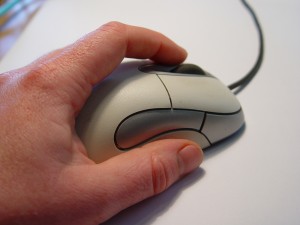 For the fourth time in a week my teenage son explains to me the steps for installing new software on my computer. “Why can’t you remember this stuff, Dad?” he asks. He appears genuinely amazed that an old man with a master’s degree cannot comprehend something any modern day first grader would grasp in an instant.
For the fourth time in a week my teenage son explains to me the steps for installing new software on my computer. “Why can’t you remember this stuff, Dad?” he asks. He appears genuinely amazed that an old man with a master’s degree cannot comprehend something any modern day first grader would grasp in an instant.
I inform my son that my brain is full. Having recently reached the age of 50, I can no longer process basic information. “See, if I were a computer,” I explain, “it would be like all my metabytes are being used. I’ve run out of space.” This, he can understand.
“Well,” he says, “you just have to delete some of the information you no longer need to make room for this new stuff. By the way, they’re called megabytes.”
If only it were that simple. No matter how hard I try I just can’t forget the combination to my seventh grade gym locker. Or my college freshman student ID, the one that enabled me to eat lunch every day some 30-odd years ago. And nothing short of comprehensive brain surgery could ever remove the lyrics to the Bee Gee’s disco hit “You Should Be Dancing” from the vast array of information currently being stored in my temporal lobe (or is it my hippocampus?—I forgot).
“Well you’ll just need an external hard drive,” he concludes. I already have an external hard drive—it’s my teenage son. What will I do when he heads off to college in a few years?
I once took great pride in being smart. But now that I’ve reached the age of 50, I’ve come to realize that the older I get, the less I know. I like to say that I’m half as smart as I was at age 25 and twice as happy. I’m not saying that ignorance is bliss, or that there is any kind of correlation between intelligence and contentment. It’s more a matter of my values changing as I have grown older.
At the age of 25 I had completed nearly 20 consecutive years of formal education. I had received a well-rounded liberal arts education from a prestigious college and a master’s degree on top of that. I will always be grateful for all I learned in my years of schooling. Yet once I finished those years, I quickly began to realize that I hadn’t learned nearly as much as I thought I had.
A certain amount of humility comes with age, with realizing that what works theoretically often fails to hold up practically. Most importantly, I came to understand that being kind gets you much farther than being right. (I keep trying to convey this truth to my teenage son but I’m guessing it’s something he’ll have to learn on his own.)
My decline in knowledge has been further impacted by the fact that about the time I turned 25 (1987), the technological revolution was just beginning. In 1987 a mouse was still a rodent, my telephone was for talking and could not be misplaced, and blackberries grew on bushes.
By the mid 1990s, with a new millennium approaching, much of what I had learned about this world and my place in it had become obsolete. I was reminded of the oft-quoted words of futurist Alvin Toffler: “The illiterate of the 21st century will not be those who cannot read and write, but those who cannot learn, unlearn, and relearn.” I was a good learner. The fact that I cannot forget my 7th grade gym locker combination is evidence that I’m not so good at unlearning.
Yet even as I struggle to keep up with a world moving at breakneck speed, I feel a sense of contentment that eluded me in my younger days. For one, I’m not so concerned about what others think of me, which means I don’t have to spend my days proving my intelligence or touting my accomplishments. As a result, I am better able to pay attention to this wonder-filled world in which I live. Oh, I slip up occasionally, especially when my ego’s been wounded. But I’m a lot better than I used to be, and consequently a much happier person.
Half as smart, twice as happy. And best of all—I’m only halfway to 100.


4 Responses to Half as Smart, Twice as Happy